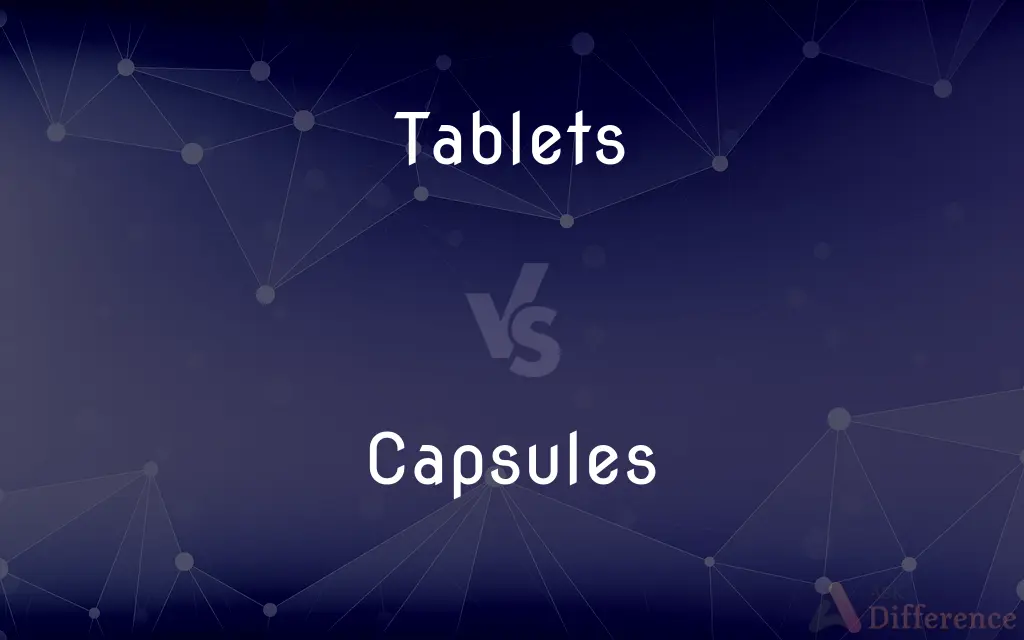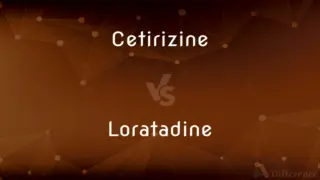Tablets vs. Capsules — What's the Difference?
By Tayyaba Rehman & Maham Liaqat — Updated on March 21, 2024
Tablets are solid dosage forms that are typically flat or oval-shaped, while capsules are cylindrical and contain medication in a gelatin shell.

Difference Between Tablets and Capsules
Table of Contents
ADVERTISEMENT
Key Differences
Tablets are a popular form of medication and supplements, known for their stability and precise dosage. They can be scored to make splitting easier, allowing for adjustable dosages. On the other hand, capsules consist of medication encased in a gelatinous shell, designed to dissolve quickly in the stomach, which can make them easier to swallow than tablets.
While tablets can be coated to protect the stomach or to control where in the digestive tract medication is absorbed, capsules can contain liquid or solid substances and offer a tasteless, odorless option that's often preferred by individuals who have difficulty swallowing pills.
Tablets often include excipients such as binders, fillers, and disintegrants to ensure the tablet holds its shape and releases its medication effectively. Capsules, however, may have fewer additives, making them a better option for those with sensitivities to certain tablet excipients.
Manufacturing processes for tablets involve pressing the medication under high pressure into a solid form, which can make them more cost-effective and have a longer shelf life. Capsules require a two-piece gelatin shell to be filled with medication, a process that can be more complex and costly.
Capsules can also offer a unique advantage in the customization of doses, as they can be easily opened to mix the contents with food or drink, a feature that's not possible with most tablets.
ADVERTISEMENT
Comparison Chart
Form
Solid, often flat or oval
Cylindrical, with a gelatin shell
Swallowing
Can be harder to swallow; may be scored for splitting
Easier to swallow; can be opened to mix with food/drink
Coating
Can be coated for stomach protection or absorption sites
No coating, but shell dissolves quickly
Excipients
May include binders, fillers, disintegrants
Fewer additives, suited for sensitive individuals
Manufacturing Cost
Generally lower, longer shelf life
Higher due to complex shell filling process
Compare with Definitions
Tablets
A solid dosage form containing medication with or without excipients.
The doctor prescribed antibiotic tablets for the infection.
Capsules
Easier to swallow; can be opened to mix contents with food.
She opened the capsule and mixed its contents with applesauce.
Tablets
Can be split to adjust doses; may have a longer shelf life.
She split the tablet to take a half dose as instructed.
Capsules
Preferred for quick dissolution and absorption in the body.
The capsule dissolved quickly, releasing the pain medication.
Tablets
Some find them difficult to swallow; can have more excipients.
He prefers not to take tablets because they're hard to swallow.
Capsules
Capsules can contain liquid medication, offering unique formulation options.
The fish oil capsules contain a liquid form of the supplement.
Tablets
Often used for controlled release of medication.
These tablets release the medication over several hours.
Capsules
A dosage form consisting of a gelatin shell containing liquid or solid medication.
He took a vitamin capsule with his breakfast.
Tablets
Tablets can be coated to protect the stomach or improve taste.
The coated tablets are easier on the stomach.
Capsules
Generally more expensive; some can't take gelatin.
They switched from capsules to tablets to reduce costs.
Tablets
A slab or plaque, as of stone or ivory, with a surface that is intended for or bears an inscription.
Capsules
A small soluble container, usually made of gelatin, that encloses a dose of an oral medicine or a vitamin.
Tablets
A thin sheet or leaf, used as a writing surface.
Capsules
(Anatomy) A fibrous, membranous, or fatty sheath that encloses an organ or part, such as the sac surrounding the kidney or the fibrous tissues that surround a joint.
Tablets
A set of such leaves fastened together, as in a book.
Capsules
(Microbiology) A polysaccharide outer shell enveloping certain bacteria.
Tablets
A pad of writing paper glued together along one edge.
Capsules
A dry dehiscent fruit that develops from two or more united carpels.
Tablets
A lightweight, portable computer having a touchscreen as the method by which data is input.
Capsules
The thin-walled, spore-containing structure of mosses and related plants.
Tablets
A small flat pellet of medication to be taken orally.
Capsules
A space capsule.
Tablets
A small flat cake of a prepared substance, such as soap.
Capsules
A brief summary; a condensation.
Tablets
To inscribe on a tablet.
Capsules
Highly condensed; very brief
A capsule description.
Tablets
To form into a tablet.
Capsules
Very small; compact.
Tablets
Plural of tablet
Capsules
To enclose in or furnish with a capsule.
Capsules
To condense or summarize
Capsuled the news.
Capsules
Plural of capsule
Common Curiosities
Why might someone prefer capsules over tablets?
Capsules are often easier to swallow and can be opened to mix with food, making them preferable for those with swallowing difficulties.
Are capsules more expensive than tablets?
Generally, yes. The manufacturing process for capsules can be more complex and costly.
What are tablets made of?
Tablets are made of medication combined with binders, fillers, and sometimes coatings.
Can tablets be split into smaller doses?
Yes, many tablets are scored, allowing them to be split into smaller, precise doses.
How do coatings on tablets benefit the user?
Coatings can protect the stomach from irritation or ensure medication is absorbed in the correct area of the digestive tract.
Why do some capsules contain liquid medication?
Liquid-filled capsules can allow for faster absorption of the medication in the body.
Why are some tablets hard to swallow?
The size, shape, and lack of a smooth coating can make some tablets difficult to swallow.
Do capsules have a longer shelf life than tablets?
Typically, tablets have a longer shelf life than capsules due to their stability and packaging.
Can the contents of a capsule be mixed with food or drink?
Yes, many capsules can be opened and their contents mixed with food or drink for easier consumption.
What is controlled release in tablets?
Controlled release tablets are designed to release medication over a period of time, rather than all at once.
Are all capsules made of gelatin?
No, there are also capsules made of cellulose for those who do not consume gelatin.
What are the disadvantages of tablet excipients for some people?
Some individuals may be sensitive or allergic to certain excipients used in tablets.
Are there vegetarian options for capsules?
Yes, there are vegetarian capsules made from cellulose rather than gelatin.
Can capsules be used for both solid and liquid medications?
Yes, capsules can encase both solid and liquid forms of medication.
Can children take capsules?
Yes, but capsules may be opened and mixed with food for easier consumption by children.
Share Your Discovery

Previous Comparison
Bargain vs. Deal
Next Comparison
Cetirizine vs. LoratadineAuthor Spotlight
Written by
Tayyaba RehmanTayyaba Rehman is a distinguished writer, currently serving as a primary contributor to askdifference.com. As a researcher in semantics and etymology, Tayyaba's passion for the complexity of languages and their distinctions has found a perfect home on the platform. Tayyaba delves into the intricacies of language, distinguishing between commonly confused words and phrases, thereby providing clarity for readers worldwide.
Co-written by
Maham Liaqat













































